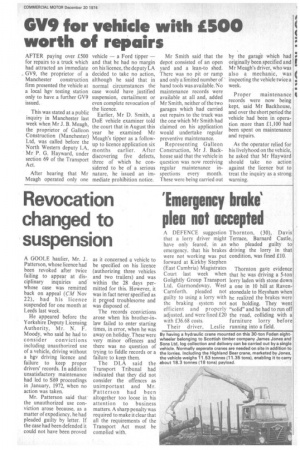GV9 for vehicle with 1300 worth of repairs
Page 19

If you've noticed an error in this article please click here to report it so we can fix it.
AFTER paying over £500 for repairs to a truck which had attracted an immediate GV9, the proprietor of a Manchester construction firm presented the vehicle at a local hgv testing station only to have a further GV9 issued.
This was stated at a public inquiry in Manchester last week when Mr J. B. Meagh, the proprietor of Galleon Construction (Manchester) Ltd, was called before the North Western deputy LA, Mr P. G. Hayward, under section 69 of the Transport Act.
After hearing that Mr Meagh operated only one vehicle — a Ford tipper — and that he had no margin on his licence, the deputy LA decided to take no action, although he said that in normal circumstances the case would have justified suspension, curtailment or even complete revocation of the licence.
Earlier, Mr D. Smith, a DoE vehicle examiner told the court that in August this year he examined Mr Meagh's tipper as a followup to licence application six months earlier. After discovering five defects, three of which he considered to be of a serious nature, he issued an immediate prohibition notice. Mr Smith said that the depot consisted of an open yard and a lean-to shed. There was no pit or ramp and only a limited number of hand tools was available. No maintenance records were available at all and, added Mr Smith, neither of the two garages which had carried out repairs to the truck was the one which Mr Smith had claimed on his application would undertake regular preventive maintenance.
Representing Galleon Construction, Mr J. Backhouse said that the vehicle in question was now receiving regular maintenance inspections every month. These were being carried out by the garage which had originally been specified and Mr Meagh's driver, who was also a mechanic, was inspecting the vehicle twice a week.
Proper maintenance records were now being kept, said Mr Backhouse, and over the short period the vehicle had been in operation more than £1,100 had been spent on maintenance and repairs.
As the operator relied for his livelyhood on the vehicle, he asked that Mr Hayward should take no action against the licence but to treat the inquiry as a strong warning.




















































































